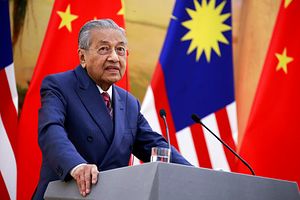Former Malaysian Prime Minister Najib Razak was, in the popular mind-set, bandwagoning with China – perhaps because of his government’s contracts on expansive infrastructure projects with Beijing. At the other extreme, when Mahathir Mohamad returned to the government in this May, saying that he might cancel those projects because of the government’s huge deficit and the possibility of default, people from both Malaysia and China became worried that the two countries’ bilateral relationship could bottom out. However, if we look back to the history of China-Malaysia ties since they officially established their diplomatic relationship in 1974, it’s clear that Malaysia has always played the so-called “hedging” game with China, even during Najib’s time in power.
Even though Malaysia and China have had official diplomatic relations since 1974, Malaysia still hesitated to deepen its ties with China in the 1970s and 1980s. The Malaysian government even set strict limitations on its citizens’ visits to China. While it seems that the total trade volume between the countries increased a lot in the first decade — from $159 million in 1974 to $368 million – the base was so small that even the mid-1980s total was negligible. The chilly relationship is easily explained: during the Cold War period, Malaysia treated Communist China as a huge security threat. The Malaysian government believed that China’s Communist Party provided support to the Malayan Communist Party, which was involved in triggering the Second Malayan Emergency. Kuala Lumpur also disagreed with China’s policy toward its diaspora. As a result, Malaysia government viewed any approach from China with suspicion.
Mahathir was Malaysia’s third prime minister since the country’s independence. He is also the longest-serving prime minister in Malaysia, and when he was sworn-in yet again after the general election in 2018, then 92-year-old Mahathir became the oldest prime minister in the world. He first governed the country from 1981-2003. During this period of time, as Joseph Chin Yong Liow from Nanyang Technical University in Singapore noted, China and Malaysia advanced their bilateral relationship substantially, thanks to a convergence of factors: the dismissal of the Malayan Communist Party, China’s distancing from the Khmer Rouge in Cambodia, and China’s opening-up toward the world.
It is Mahathir who set the tone for Malaysia’s China policy ever since. Economic development was the top priority of Mahathir’s agenda during his first term as prime minister. In 1986, Mahathir’s administration announced Industrial Master Plan 1, replacing the Import Substitution Industrialization Strategy (ISIS) with the Export-Oriented Industrialization Strategy (EOIS). The strategy aimed at utilizing trade to drive overall national economic growth. At about the same time, China started its “reform and opening up,” and thus became a huge market for Malaysian enterprises. As a result, beginning in the 1990s, economics was the primary consideration in Malaysia’s China policy and Mahathir is known for his “economic pragmatism” toward China. From 1990 to 2009, the total trade volume between the two countries sky-rocketed from $1.176 billion to $51.838 billion. A similar increase happened in investment as well. However, as Professor Poon Kim Shee of Ritsumeikan University, Japan, pointed out, Mahathir’s China “bandwagoning” only applied to economics, hoping for short-term benefits. On China, his long-term strategic-cum-security thinking is ambivalent. It seems likely Mahathir will adopt a similar attitude today.
Meanwhile, it is misleading to say that Najib was “bandwagoning” with China in all aspects, even though he purchased four Littoral Mission Ships from China. While Mahathir had a sense of dissatisfaction and suspicious toward the West (probably because they stood aside or even provided the wrong solutions to Malaysia during the 1998 Asian Financial Crisis), Najib actively engaged with the West, notably the United States. Murray Hiebert from the Center of Strategic and International Studies noted that U.S.-Malaysia relations had improved dramatically since Najib took over the premiership in 2009. The two sides advance their security cooperation, for example, in the fields of counterterrorism and information-sharing between security forces. Therefore, even while Najib was deepening economic cooperation with China, he was also actively seeking a balanced strategy with other big powers.
Nowadays, although Mahathir has threatened to review or even cancel China-backed infrastructure projects in Malaysia, it does not mean that he will abandon the relationship with China. Instead, it denotes that he may redirect his past “bandwagoning” or “pragmatic” economic policy to other fields. His recent visit to China, with a focus on e-commerce, technology and agriculture, may provide some hints on his new China policy in the future. During his visit, he visited Alibaba, the largest e-commerce company in China, and Da-Jiang Innovations, a producer of drones and aerial photography systems. In addition, Mahathir witnessed the signing of an MoU on exporting Musang King durians to China, and also visited the Chinese Academy of Agricultural Sciences.
All of these show that Mahathir is still interested in learning more about China’s recent success in economic development, and would like to direct close cooperation to these fields. Thus we should expect Mahathir to continue the previously friendly Malaysia-China relations, even while keeping the long-standing balancing strategy in place.
Li Xirui is a research assistant at the China-ASEAN Research Institute at Guangxi University, China.

































